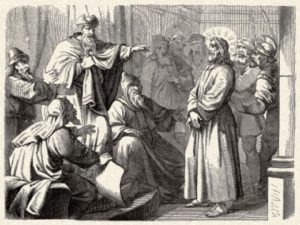[Greek] κατηγορία (katēgoria), [Latin] accusare, [Latin] accusatio: accusation, charge, criminal charge, classification; Jn.18:27, 1Tim.5:19, Tit.1:6, Lk.6:7

Socrates was accused of being an atheist
Background Information:
Greek Hellenism: This term essentially means to make a formal charge or accusation against someone in the public assembly (agora). This accusation is made in a judicial manner before witnesses or at a public tribunal. An accusation is lodged against a person. Then this person can attempt to vindicate himself with a statement in defense (apology). Socrates was accused of being an atheist. He was charged with not accepting the gods of the state. He believed that an inner voice lead him to find the truth. Socrates makes an apology to defend his conduct. Socrates claims that he was given wisdom that he knows nothing. Socrates explains that it his duty to question the false wisdom of “wise” men. Xenophon’s Hellenica 2.1.31 states ” Many charges began to be urged against the Athenians.” Antiphon’s On the Choreutes states “Indeed they deserve to win neither gratitude nor credence with these charges of theirs.”
New Testament: This term means charge and accusation. The scribes and Pharisees saw Jesus healing a man with a withered hand in the synagogue. Furious of what they had seen, they sought an opportunity to accuse Jesus. Pilate asks the Jews about what is the charge against Jesus. As a result, Pilate tells the Jews to judge Jesus with their own laws. 1Tim. and Titus shows the importance of choosing presbyters with no accusations against them.
Scripture:
“So Pilate came out to them and said, ‘What charge do you bring against this man?’” Jn. 18:29
Pilate requires proof of these charges made by witnesses against Jesus. Pilate eventually found that Jesus was not guilty of these charges.
“The scribes and the Pharisees watched Him closely to see if He would cure on the Sabbath so that they might discover a reason to accuse Him.” Lk.6:7
The scribes and Pharisees wanted proof to see if Jesus would perform these works on the Sabbath, the day of rest. This evidence would be used to accuse Jesus of violating the Sabbath.
“Do not accept an accusation against a presbyter unless it is supported by two or three witnesses.” 1 Tim. 5:19
It was important to have witnesses to make a formal accusation. An unfounded accusation could greatly ruin the reputation of someone in a ministerial position.

The scribes and Pharisees accuse Jesus
Conclusion:
Category, categorical, accuse, accusation
From this comes the terms category and categorical. Essentially, an accusation toward someone often gives that person a certain category as a criminal. It is also interesting to note that a predicament is the state of being in a difficult or troubling situation.
